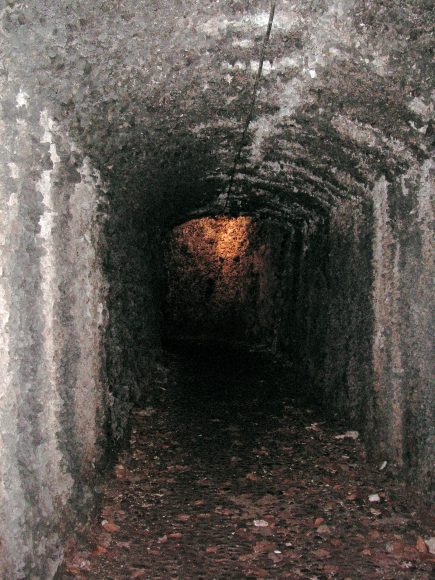
An air raid shelter – Photograph by Matt Gibson, from Flickr under creative commons license by 2.0 (share, adapt)
The woman in Damascus didn’t send these thoughts to me. I don’t know her or even her name. We have never met, but this is how I imagine her, lodged as she is in my brain. It is as if she had come to me in her old age, dressed in black, to tell me the dangers she faces and how she is coping with them, and as if I were meant to be her messenger. She is my hallucination.
The last she saw of her husband was five years ago when he climbed into a truck with a crowd of young men, including her son, to join the opposition in combat. Too much time has passed for her to expect her husband to return. He would not have survived the fighting. Now, with her fingers shrunken, turned almost to bone, she lost the ring he gave her long ago. It happened when, talking to the sky, she gestured emotionally toward the Barada River and the ring flew off her finger, over the riverside wall, and plunged into a shallow, polluted stream down below, which was the river’s present state. There was no sound of metal striking a pavement and rolling, as there might have been if she had been facing another way. She could not see the ring amidst the sluggish debris below, and no one was there to help her, even if it could have been retrieved. There was simply loss, immediate sorrow, and a haunting sense that the water was sick, ailing as she was.
These were the days when she managed with almost nothing. Rather than travel a long distance looking for handouts of food that might or might not be distributed to the “internally displaced,” she rummaged through the cupboards in abandoned houses, turning meager crumbs into a meal for the day, and wetting her lips with water captured from drain pipes.
She would sit for long hours without moving, listening with her eyes closed to explosions that gradually came nearer, and to the cascade of rocks and rubble nearby that would invariably follow the sound of a rocket or a blast of TNT in a barrel bomb. Her windows were boarded, but daylight, a weak intimation of the sun somewhere above on its daily round, crept across her open doorway and down the hallway to where she was.
Thoughts came to her of creatures and objects from the past, as if ghosts of them had come to join her in her solitude. The ghost of “Dear One,” a gray cat she had in childhood delicately stepped past her, and she would say silently, with her heart, “Dear One, how are you?” She remembered a lightweight kettle she once had that shook and rattled as the water came to a boil, its fat body feeling the heat of blue flames at its base. Only reluctantly did it eventually surrender a bit of steam through its throat and give an accompanying weak whistle, more like a timid whine. There was not enough water now for tea, and no tea to brew.
She thought of her younger self, as if it were a shadowy incarnation of former innocence, one that didn’t know what injustice felt like, or blood on the ground looked like, or how it was to live intimately with deep pain, fear, war, raw survival. Her tears had stopped years ago. Now she had a feeling that she might let go entirely, that tomorrow she might walk toward the explosions and be released with one stunning blow from the long war that had taken away her husband, her son, and many others’ loved ones, relatives, friends. They all came to her, one by one, calling out to her, “Dear one, how are you?”
“Tomorrow,” she thought, I shall walk toward the explosions, or I shall walk toward the place where they distribute food. It may be that I shall die, or that I shall keep on declining and sink into a delirium of pots, pans, scraps of food, voices, the river. Maybe the war will end and I shall be saved, be at peace.” She thought how strange that would seem after all that had happened. “What use would the whole tragedy have been? It is like a gigantic tantrum, this madness, this ravaging, and I may be,” she thought, “too weak for any tomorrow.”
From the safety and comfort of my home I dare to speak of her hunger, suffering, and tiredness, as if I could know what real threats she faces and deliver to you her message about the violence and destruction around her, wherever she turns. I know, at least, that the war’s outer manifestations, the bombs, the inhumanity, are unspeakably obscene. Surviving them, I imagine, entails an unbroken, unceremonious, steady stream of all-too-human, elemental, everyday minutiae, but those minutiae have changed, requiring people to adjust to daily gunfire, car bombs, air attacks. Only the woman in Damascus and all those with her know how much more there is to describe or to withhold.








